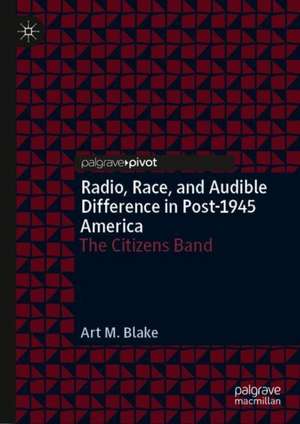Radio, Race, and Audible Difference in Post-1945 America: The Citizens Band
Autor Art M. Blakeen Limba Engleză Hardback – 19 noi 2019
Preț: 403.94 lei
Nou
Puncte Express: 606
Preț estimativ în valută:
77.30€ • 81.30$ • 64.39£
77.30€ • 81.30$ • 64.39£
Carte tipărită la comandă
Livrare economică 04-18 ianuarie 25
Preluare comenzi: 021 569.72.76
Specificații
ISBN-13: 9783030318406
ISBN-10: 3030318400
Pagini: 92
Ilustrații: XV, 92 p.
Dimensiuni: 148 x 210 mm
Greutate: 0.29 kg
Ediția:1st ed. 2019
Editura: Springer International Publishing
Colecția Palgrave Pivot
Locul publicării:Cham, Switzerland
ISBN-10: 3030318400
Pagini: 92
Ilustrații: XV, 92 p.
Dimensiuni: 148 x 210 mm
Greutate: 0.29 kg
Ediția:1st ed. 2019
Editura: Springer International Publishing
Colecția Palgrave Pivot
Locul publicării:Cham, Switzerland
Cuprins
1. America in Color: The Postwar Audible Spectrum.- 2. The Sounds of White Vulnerability.- 3. Mobilizing Black Technoculture.- 4. Queering the Spectrum from Radio to Local TV.
Notă biografică
Art M. Blake is Associate Professor of History and a faculty member in the Communication and Culture graduate program at Ryerson University, Canada.
Textul de pe ultima copertă
In the second half of the twentieth century, new sounds began to reverberate across the United States. The voices of African-Americans as well as of women, Latinx, queer, and trans people broke through in social movements, street protests, and in media stories of political and social disruption. Postwar America literally sounded different. This book argues that new technologies and new mobilities sharpened American attention to these audibly coded identities, on the radio, on the streets and highways, in new music, and on television. Covering the Puerto Rican migration to New York in the 1950s, the varying uses of CB radio by white and African American citizens in the 1970s, and the emergence of audible queerness, Art M. Blake attunes us to the sounds of race, mobility, and audible difference. As he argues, marginalized groups disrupted the postwar machine age by using new media technologies to make themselves heard.
Caracteristici
Focuses on voice and sound, an understudied dimension of race and gender studies Illuminates the adaptation of citizens band (CB) radio technology by African Americans Appeals to scholars and students of race and gender, communication studies, urban studies, American cultural studies, and post-1945 American history
